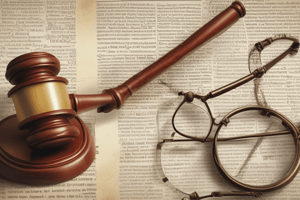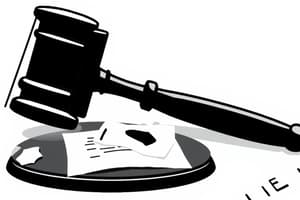Podcast
Questions and Answers
What characterizes bad science?
What characterizes bad science?
- Producing reliable and reproducible results
- Relying on anecdotal evidence (correct)
- Utilizing proper methodology
- Considering broader scientific data and trends
Which of the following is an example of scientific misconduct?
Which of the following is an example of scientific misconduct?
- Reporting all results, whether they support the hypothesis or not
- Hypothesising After Results Known (HARKing)
- Cherry-picking statistically significant results
- Falsifying data in stem cell research (correct)
What is the Fraud Triangle in the context of scientific misconduct?
What is the Fraud Triangle in the context of scientific misconduct?
- A triangle used to fabricate data
- A concept used to explain factors contributing to fraud (correct)
- A triangle representing infamous fraud cases
- A triangle that supports questionable research practices
Which individual fabricated data in numerous social psychology studies?
Which individual fabricated data in numerous social psychology studies?
What does selective reporting involve in questionable research practices (QRPs)?
What does selective reporting involve in questionable research practices (QRPs)?
Why are non-significant results still considered results in the context of QRPs?
Why are non-significant results still considered results in the context of QRPs?
What is the primary concern regarding scientific misconduct for the individual researcher?
What is the primary concern regarding scientific misconduct for the individual researcher?
What is one of the major implications of scientific misconduct for the scientific community?
What is one of the major implications of scientific misconduct for the scientific community?
What is the primary impact of scientific misconduct on the public?
What is the primary impact of scientific misconduct on the public?
Which of the following is NOT mentioned as a solution to counter the replication crisis?
Which of the following is NOT mentioned as a solution to counter the replication crisis?
What is a characteristic of pseudoscience?
What is a characteristic of pseudoscience?
What is the reason mentioned in the text for why people believe in pseudoscience?
What is the reason mentioned in the text for why people believe in pseudoscience?
What is the primary function of an Institutional Review Board (IRB)?
What is the primary function of an Institutional Review Board (IRB)?
Which of the following is NOT one of the criteria for IRB approval of a research study?
Which of the following is NOT one of the criteria for IRB approval of a research study?
How must researchers handle studies involving deception, according to the text?
How must researchers handle studies involving deception, according to the text?
What does the term 'expedited studies' refer to in the context of IRB review?
What does the term 'expedited studies' refer to in the context of IRB review?
What is required when conducting research with children or mentally challenged individuals?
What is required when conducting research with children or mentally challenged individuals?
What is the purpose of the 'informed consent' process in research involving human participants?
What is the purpose of the 'informed consent' process in research involving human participants?
How did the therapist respond when Emmanuel stated his intention to end his life?
How did the therapist respond when Emmanuel stated his intention to end his life?
What was Emmanuel's response when the therapist asked him to postpone his decision?
What was Emmanuel's response when the therapist asked him to postpone his decision?
What happened after the therapist's session with Emmanuel?
What happened after the therapist's session with Emmanuel?
What additional steps could the therapist have taken in this case?
What additional steps could the therapist have taken in this case?
How might the therapist's personal values or issues influence their approach with a suicidal client like Emmanuel?
How might the therapist's personal values or issues influence their approach with a suicidal client like Emmanuel?
Which of the following actions might the therapist have pursued after Emmanuel's suicide?
Which of the following actions might the therapist have pursued after Emmanuel's suicide?
What is the central idea behind the 'scientist-practitioner model'?
What is the central idea behind the 'scientist-practitioner model'?
Which of the following is NOT an assumption of the scientist-practitioner model?
Which of the following is NOT an assumption of the scientist-practitioner model?
Which of the following best describes the concept of 'falsifiability' in scientific reasoning?
Which of the following best describes the concept of 'falsifiability' in scientific reasoning?
What is the 'essence of bad science'?
What is the 'essence of bad science'?
Which of the following statements is NOT true regarding the scientific reasoning process?
Which of the following statements is NOT true regarding the scientific reasoning process?
What is the primary role of a 'consumer' in the scientist-practitioner model?
What is the primary role of a 'consumer' in the scientist-practitioner model?
What is the primary purpose of the 'empirical evaluator' role in the scientist-practitioner model?
What is the primary purpose of the 'empirical evaluator' role in the scientist-practitioner model?
Which of the following statements best describes the relationship between science and the legal system, according to the text?
Which of the following statements best describes the relationship between science and the legal system, according to the text?
What is the significance of the phrase 'the absence of evidence is not evidence of absence'?
What is the significance of the phrase 'the absence of evidence is not evidence of absence'?
What is the primary critique of the scientist-practitioner model?
What is the primary critique of the scientist-practitioner model?
Flashcards are hidden until you start studying
Study Notes
Converging Evidence
- The legal system and science both make decisions based on evidence
- In the legal system, a small amount of evidence leads to suspicion, while a large amount of evidence is needed to convict
- "The absence of evidence is not evidence of absence" - emphasizes the importance of considering all available evidence
Steps of the Research Process
- Develop a research question
- Conduct a literature review
- Generate a research hypothesis
- Choose a research design
- Evaluate the ethics of the research
- Collect and analyze data; form conclusions
- Report research results
Science in Context
- High standards for integrity and ethical conduct are essential in science
- Scientists must not fabricate data, plagiarize, or selectively report research findings
- Moral context is crucial in scientific research
The Scientist-Practitioner Model
- Integration of scientific knowledge and application
- Emphasis on the successful integration of science and practice
- Three roles of practicing psychologists: Researcher, Consumer, and Empirical Evaluator
Assumptions of the Scientist-Practitioner Model
- Professionals with knowledge and skills related to research will facilitate effective psychological services
- Research is imperative to the development of a scientific database
- Researchers' direct involvement in clinical practice will result in studies on important social issues
Critiques to the Scientist-Practitioner Model
- Some research findings may not be applicable to practice
- Trained specialists may decrease research efforts after graduation
- The scientist-practitioner model is still the best approach to becoming effective professionals
Scientific Reasoning
- Empirical approach: identifying a problem, gathering information, formulating explanations, conducting tests, and deriving a conclusion
- Karl Popper's concept of falsifiability: "Falsify-ability" or fallibilism - embracing the possibility of error
The Way Forward: Open Science as a Solution
- Large-scale replications to counter the replication crisis
- Pre-registrations in journal articles
- Transparency and data monitoring
- Open-access journals
The Limits of Science
- Science is not omniscient or infallible
- It is conducted by human beings, who are prone to making mistakes or misinterpreting information
- Science is still the best method for understanding the universe, particularly given the error-correction mechanisms integral to it
Pseudoscience
- Presented as scientific but lacking empirical evidence
- Often relying on unfounded theories or supernatural explanations
- Two features: easy to find evidence for claims and claims that cannot be falsified
Research Ethics
- Institutional Review Boards (IRBs) oversee human research
- Criteria for IRB approval: minimizing risk, justifying potential benefits, fair selection of participants, informed consent, and data monitoring
- Deception and debriefing: justifying deception, thoroughly explaining the nature of the study, and considering the rights of participants
Bad Science and Fraud
- Bad science: lacks proper methodology, relies on anecdotal evidence, and often fails to produce reliable and reproducible results
- Fraud: fabrication, falsification, and plagiarism
- Questionable research practices: cherry-picking, selective reporting, p-hacking, and HARKing
Studying That Suits You
Use AI to generate personalized quizzes and flashcards to suit your learning preferences.




